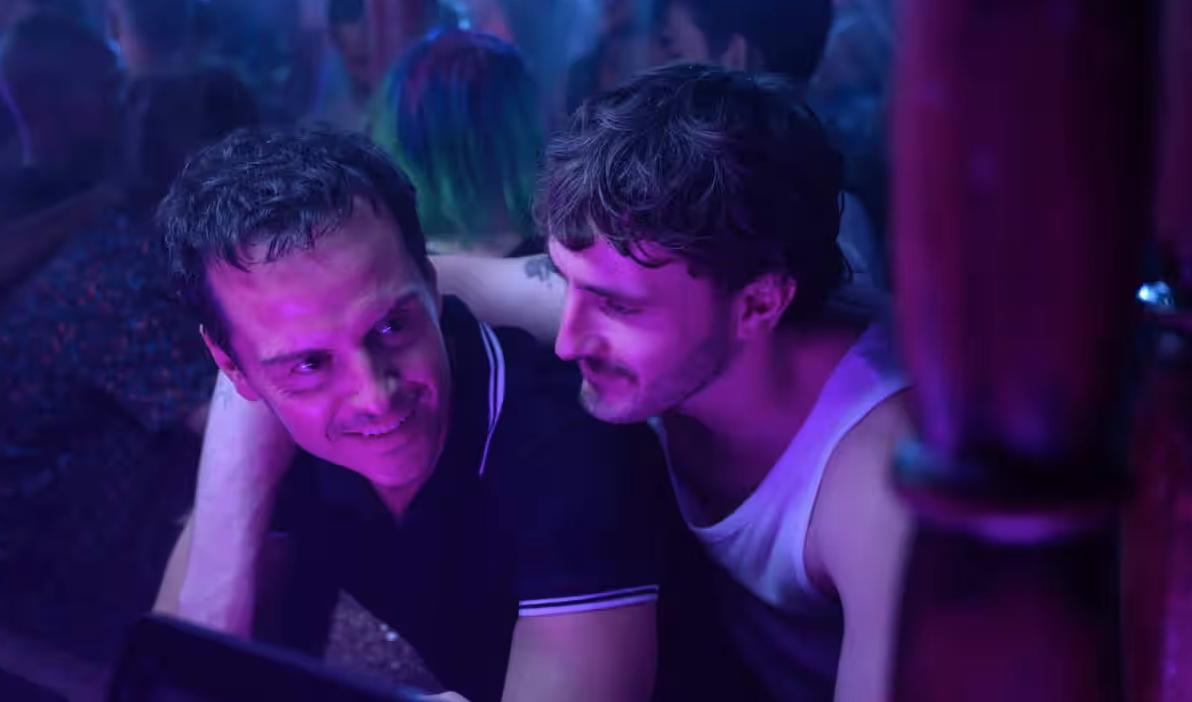
You can’t hide from childhood trauma. This is true of all traumas—from something truly catastrophic like the death of a parent, to something relatively minor (like a particularly penetrating schoolyard insult) that you can’t quite shake off.
For gay men, in particular, the trauma can be deep-seated: getting bullied in school, getting kicked out of the family home, and, if you’re of a certain age, living through the fear and tragedy of AIDS.
Adam (Andrew Scott), the protagonist of Andrew Haigh’s heart-crushing All of us Strangers, had a fairly normal, middle class childhood, for a while at least. He knew he was gay at a young age, and got relentlessly teased at school—at one point, his classmates shoved his head down a toilet. But didn’t tell his parents. They were kind, but hardly enlightened. And Adam always had a hunch—a correct one it turns out—that his father (Jamie Bell) secretly suspected his son was gay but was in denial about it. (He told his son to stop crossing his legs, because he looked like a girl—a pointed indignity Adam carries with him to this day.) Instead, his father adopted something of a “don’t ask, don’t tell” policy around the house.
These “minor” traumas turned to a major one, when Adam’s parents died in a car crash when he was 12. He was sent to live at his grandmother’s house. At a new school, he hid himself, acted straight. And when he finally came out, it was in the middle of the AIDS crisis.
So when we meet Adam now, he’s a lonely, isolated, closed off man. He lives in a brand new apartment complex in London that has few tenants. One of them, a handsome stranger named Harry (Paul Mescal), shows up one night, drunk. He has noticed Adam noticing him through the window. Can he come in? (The window, by the way, is a recurring theme in this film—the glass panes representing the otherness of people, the inaccessibility of their interior lives.)
Adam, used to being alone and a bit taken aback by this stranger’s boldness, demurs. Harry leaves, but they meet up a day or so later, in the elevator, and strike up a conversation. Adam invites Harry over and they become lovers.
Harry, who is younger than Adam, had his own version of trauma to deal with—a family that rejected him because he’s gay. But when he finds out about Adam’s parents, he understands that Adam is dealing with something extremely heavy. He is uncommonly kind and gentle with him. Harry’s kindness and sexual ministrations open Adam up. He becomes some version of happy.
While all this is happening, Adam is living a double life, of sorts. He’s visiting his childhood home—the house he lived in before his parents died—and visiting with his parents. Yes, his parents are there—frozen in the 1980s (Frankie Goes to Hollywood and Thompson Twins are often playing in the background)—actually a little younger than Adam is now.
They seem to know that this is some sort of liminal state—they marvel over how big Adam has grown and want to hear all about his life since they died. His mother (Claire Foy) is a bit dismayed to discover her son is gay. “It’s a lonely life,” she says. Adam explains that things have changed for gay people. He can have children now—even get married. If he’s lonely, it has nothing to do with him being gay, he says, unconvincingly.
His father, with his mustache, ugly sweaters, and bad haircut, seems older than his son. He is unsophisticated, thoroughly middle class—Adam has more of an urbane vibe. But Adam’s father is self-aware enough to have regrets. He’s sorry that he didn’t console his son, who was crying in his room, bearing the pain of his bullying alone. He even fears that, when he was young, he might’ve been the kind of boy who would join in on the bullying. The two men hug. The camera pulls back. Dad is now hugging Adam as a 12-year-old child.
So what exactly is happening here? Is Adam cracking up? Is the film supernatural? Haigh never fully answers that question—nor should he. The film, which is exquisitely acted by its four leads, especially Scott, is about loneliness and the need for connection. It’s about the particular trauma of the gay male—yes, even in these enlightened times. But its themes of longing to be accepted—by one’s parents, by society, by a romantic partner—are universal.
It is about Adam. It is about Haigh. It is about all of us.
